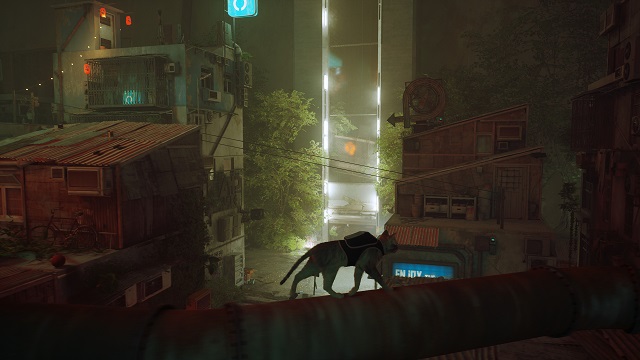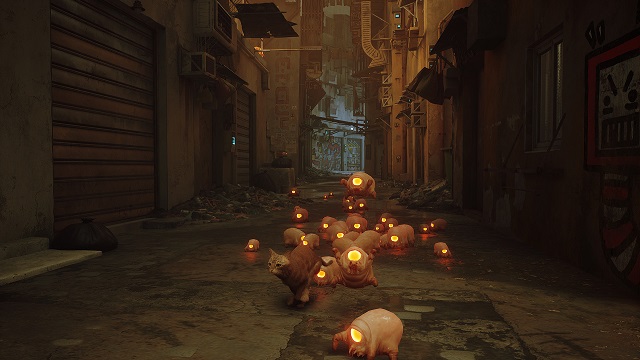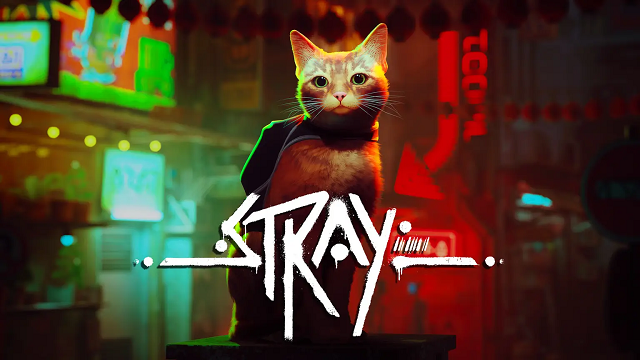Not many people would have predicted that PlayStation’s biggest release of July 2022 would be a third-person adventure game about a cat, but Stray is a perfectly good choice as a leading game. A refreshing change of pace from the action-heavy, big-budget releases that otherwise lead the gaming release calendar, you don’t necessarily need to be a cat lover to get the most out of this one — though it certainly helps.
The unnamed protagonist is a stray ginger cat living in a world where humanity died out a long time ago. As he sets out with his feline family, a mistimed jump sees him plunge into the depths of a mysterious long-forgotten world. The decaying dystopian cybercity is a mix of rubbish-strewn alleys, murky sewers, and neon-lit backstreets, but while humans may have been wiped out hundreds of years before, there are still secrets that must be uncovered. With the help of a mysterious flying drone companion called B-12, the cat sets out to reach the outside once again.
A world without humans
The world beneath may be bereft of humans but it is still occupied by their robot workers, only these have evolved to be sentient with their own personalities. There’s a martial arts-loving Guardian, a musician who’s lost his music, and a mischievous duo who toss paint tins at each other until one is dropped to create a mess in the street below. Aside from clothing, these look mostly identical apart from the charming and diverse range of faces that give more of an idea of their personality. The robots are peaceful for the most part and their city is a welcome safe haven where they help to drive the story forward, as well as giving out the occasional side quest.
Most of the missions and overall gameplay involve exploring the forgotten world and solving simple puzzles to open up new areas. The journey is split into chapters, some of which focus on linear environments going from one destination to another with a guided path. Other areas take on the form of open-world towns where players have to work things out a lot more, especially in terms of the paths the cat can take to reach rooftops and buildings that would be inaccessible to larger beings. The puzzles make clever use of the cat’s limited abilities without being too repetitive or overcomplicated. For the odd occasion you may be stuck, B-12 has hints although I never found these to be anything more than a reminder of my current objective and not particularly helpful.

Developer BlueTwelve Studio is clearly a lover of cats and has studied their movements intensely. These movements are very accurate, such as the cat’s agility which allows you to scale scenery like bins, pipes, and air conditioning units to reach rooftops, but not to climb impossible heights. It will hiss at surprises it deems threatening, nuzzle friendly robots, meow to attract attention, and even hide in the proliferation of cardboard boxes spread around the town. Making robots trip over him never got old. The only downside is that the scratching animations rarely match the control inputs, so most of the time players don’t know if it’s working.
B-12 is there to do everything the cat can’t do. He can translate robot conversation, seeing as they’ve even created their own language. He can operate electronics like door switches and transform useful objects into an inventory the cat carries on its back in a harness. The cat’s limitations become even more apparent in the moments when B-12 is unable to use his abilities. They can solve puzzles using each other’s abilities or even team up to be in two places at once.
The horrific side of a dystopian world
Not everything in the dystopian city is peaceful, though. Outside of the safe zones can be found the lasting effects of the pandemic. A horrific vein-like matter covers surfaces and takes over all previous life. Zurks, pink blobby creatures that look suspiciously like Half Life’s head crabs and are just as dangerous, burst from pulsing sacs when they detect nearby movement. They’re the main challenge preventing the cat from returning to the outside and will easily kill him.
The Zurks won’t hesitate to swarm the cat and they result in chase sequences that are easily the most stressful parts of the game. There’s nothing more frustrating than trying to find out what you have to do next while being pursued by hordes of bloodthirsty and metal-hungry Zurks. They also highlight a surprising limitation of the cat’s movement in that he cannot jump over them. Jumping is limited to climbing around the scenery and only when a button prompt is highlighted, a decision that seems a bit questionable with how agile cats can be. Other issues included some minor visual glitches, including a wandering robot that got stuck. The movement was also choppy enough in places that it gave me motion sickness after a few hours of playing — I’d advise turning down the look sensitivity from the default setting if that’s sometimes a problem for you.

Stray Review: Final Verdict
Despite the odd slip-up, Stray is a (mostly) relaxing game that takes clever cat interactions and turns them into a compelling adventure. The 8-10 hour story (on a completionist’s run) will certainly tug on the heartstrings in places but will not overstay its welcome. The gameplay is simple enough that it can be enjoyed by all ages although the younger children may find the Zurk imagery a bit scary. Those playing Stray on PlayStation Plus should definitely give this one a go, while those looking to buy the game on release should not have much hesitation.
-
Clever and realistic cat interactions
-
Compelling story
-
Simplistic puzzles that aren't too repetitive
-
Some minor graphical glitches
-
Can trigger motion sickness





